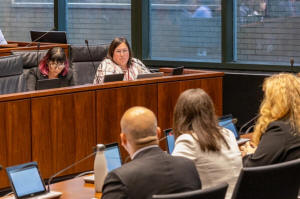Lawmakers criticize Pritzker administration’s handling of noncitizen
health care limits
 Send a link to a friend
Send a link to a friend
[July 20, 2023]
By ANDREW ADAMS
Capitol News Illinois
aadams@capitolnewsillinois.com
 Members of a state rulemaking oversight committee voiced concerns
Tuesday that Gov. JB Pritzker's administration didn’t sufficiently seek
public input on its plan to cap enrollment in Medicaid-like health care
programs for noncitizens. Members of a state rulemaking oversight committee voiced concerns
Tuesday that Gov. JB Pritzker's administration didn’t sufficiently seek
public input on its plan to cap enrollment in Medicaid-like health care
programs for noncitizens.
The controversy centers on the Health Benefits for Immigrant Adults and
Health Benefits for Immigrant Seniors programs, which provide health
care benefits to low-income noncitizens who would qualify for Medicaid
benefits if not for their citizenship status.
During May budget negotiations, lawmakers gave the Pritzker
administration authority to cap program spending through emergency
rulemaking, and his administration exercised that authority in late
June.
Those emergency rules froze enrollment in HBIA, which serves noncitizens
aged 42 to 64, and set a cap for enrollees in HBIS, which provides
benefits to noncitizens age 65 and over. The changes also reduce
reimbursement rates for two large public hospitals, institute copayments
and coinsurance for some services and transition some enrollees into the
state’s Medicaid managed care program in an effort to reduce costs.

The Joint Committee on Administrative Rules on Tuesday heard from
representatives of the state’s Department of Healthcare and Family
Services, who defended the rules.
The rules are designed, according to IDHFS officials, to limit costs for
the program, which they say would be underfunded by hundreds of millions
of dollars without the changes.
“We have projected liabilities of about $1.2 billion for the program if
no changes are made,” IDHFS chief of staff Ben Winick said at JCAR’s
Tuesday meeting in Chicago.
He noted the General Assembly allocated $550 million while giving the
administration the authority to cap costs.
Pritzker’s administration proposed the changes in both “emergency” and
“permanent” administrative rules. While emergency rules are generally
valid for 150 days, the law authorizing the administration to limit
program enrollment also allows it to refile emergency rules once they
expire. That means that unless JCAR votes by a three-fifths majority to
suspend the rules, they would remain in place as long as the department
wants, at least for the next two years.
JCAR – which consists of six Democrats and six Republicans and is
responsible for overseeing policy making within the state’s executive
branch – didn’t take action on either the emergency or permanent rules
Tuesday, although the committee can still take action at a future
meeting.
Both Democratic and Republican members shared concerns with IDHFS
officials that mostly focused on the process by which the rules were
developed.

[to top of second column]
|

Sen. Cristina Castro, D-Elgin, and Rep.
Eva-Dina Delgado, D-Chicago, question representatives of the
Illinois Department of Healthcare and Family Services about proposed
changes to programs that offer health care benefits to noncitizens
in Illinois. (Capitol News Illinois photo by Andrew Adams)

Sen. Cristina Castro, an Elgin Democrat and member of the Illinois
Legislative Latino Caucus, said that the department failed to consult
stakeholders in the immigrant advocacy community when developing the
rules.
“You quickly filed both the emergency rule and permanent rule. There’s
obviously been no discussions with advocates on either, it seems,”
Castro told IDHFS officials.
Rep. Eva-Dina Delgado, D-Chicago, also said she wanted to see “immediate
action” to engage stakeholders and advocacy groups before moving forward
with the process of implementing the department’s proposed permanent
rules. She particularly criticized the department’s plan to issue a
14-day notice before freezing enrollment in HBIS.
“I’d like you all to engage with those that are impacted because I just
don’t know if that’s going to be workable,” Delgado said. “If you change
somebody’s health care every two weeks and expect them to follow along,
even if they are fully language proficient, I think you’re just asking
for problems.”
On the Republican side, Rep. Steven Reick, R-Woodstock, said that the
rules represented an “abdication” of the General Assembly's
responsibility and that they should have been considered in legislation,
not in administrative policy.
“This is another instance of a governor that thinks he can legislate on
his own,” Reick said. “First he did it with 47 disaster declarations and
now he’s doing it with emergency rule.”
Sen. Bill Cunningham, a Chicago Democrat and co-chair of JCAR, said the
committee was frustrated at the lack of stakeholder engagement from
several agencies. JCAR also discussed a controversial emission rule
change for heavy industries Tuesday, objecting to two state agencies’
hurried implementation process.

“I think you heard throughout this meeting a frustration from committee
members about the lack of engagement between agencies and various
stakeholders and that was true across the board,” he said in an
interview after the hearing.
Cunningham said the committee will “likely” have another discussion
about the health care rules next month.
“I am hopeful they will act in a good faith effort to collaborate more
closely with the stakeholder groups,” Cunningham said.
Capitol News Illinois is a nonprofit, nonpartisan news
service covering state government. It is distributed to hundreds of
print and broadcast outlets statewide. It is funded primarily by the
Illinois Press Foundation and the Robert R. McCormick Foundation, along
with major contributions from the Illinois Broadcasters Foundation and
Southern Illinois Editorial Association. |